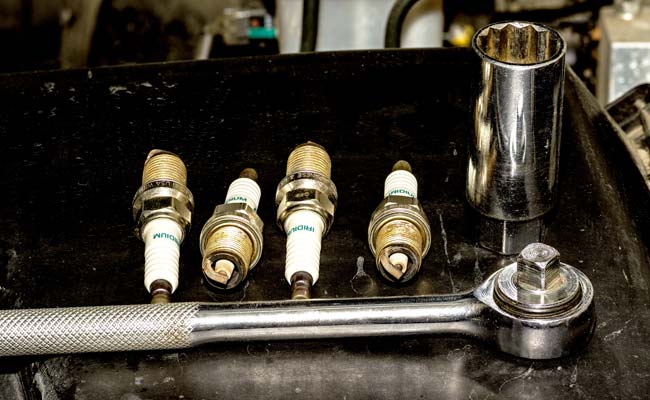
Auto component industry pins its hopes on GST
Vanita Peter D’souza | The Dollar Business  While all the hush bush of NDA government’s ‘Make in India’ and Union Budget is almost coming to an end, the automobile sector looks still puzzled. On one side where petrol has become expensive post budget, automobile sector is still waiting for Finance Ministry decision on restoration of lower excise duty. Expensive petrol and higher excise duty is likely to hit the industry. The domestic automobile component industry is now eyeing on the implementation of GST which would give some relief to the automobile sector. “Now, only GST can help us. Government should implement it as soon as they can,” said a Rajkot based auto component manufacturer. Vinnie Mehta, Director General, Automotive Component Manufacturers Association (ACMA), said, “The excise duty cut that was withdrawn post December 31, 2014 on automobiles has not been reinstated; had this been continued it would have surely impacted the vehicle sales positively and thus the entire value chain. While other measures from the Government, especially the interest rate cut will have a positive effect. However, on stand-alone basis, from a component industry’s perspective, the excise duty gets CENVAT-ted, therefore the excise rate doesn’t impact the auto component sector.” In February 2014, the previous UPA government, in order to boost the automobile sector, had cut excise duty on cars, SUVs, two-wheelers and consumer durables in the interim Budget in February. While in June 2014, the new NDA led government extended the excise duty concessions by six months to December 31. As of date, the excise duties are back to the rates that existed before February 2014. ACMA feels that that at a macro-economic level the government is making concerted efforts to bring in growth and stability. “If we look at the larger picture, there are other measures in the budget such as allowing 20 per cent additional depreciation on new plant and machinery as against 10 per cent, setting up of an electronic Trade Receivables Discounting System (TReDS) for financing of trade receivables of MSMEs to improve the liquidity in the sector and the intent to implement GST by next fiscal. Moreover, the budget also announced enhancement of time limit for taking CENVAT credit on inputs and services from six months to one year,” Mehta told The Dollar Business. That apart, reduction of rate of income tax on royalty and fees for technical service from 25 per cent to 10 per cent will enable technology absorption in the auto component sector, the Director General added. However, ACMA recommends the government to review Automotive Mission Plan with a roadmap until 2026, address the cost of capital in India, which is the highest among the emerging markets. Mehta wanted the government to implement the technology up-gradation scheme for the components sector, fast introduction of GST and removal of procedural hurdles for ease of doing business. Last but not the least, he wanted to the Centre to revamp the definition of MSME as more that 70% of ACMA members are MSME.
While all the hush bush of NDA government’s ‘Make in India’ and Union Budget is almost coming to an end, the automobile sector looks still puzzled. On one side where petrol has become expensive post budget, automobile sector is still waiting for Finance Ministry decision on restoration of lower excise duty. Expensive petrol and higher excise duty is likely to hit the industry. The domestic automobile component industry is now eyeing on the implementation of GST which would give some relief to the automobile sector. “Now, only GST can help us. Government should implement it as soon as they can,” said a Rajkot based auto component manufacturer. Vinnie Mehta, Director General, Automotive Component Manufacturers Association (ACMA), said, “The excise duty cut that was withdrawn post December 31, 2014 on automobiles has not been reinstated; had this been continued it would have surely impacted the vehicle sales positively and thus the entire value chain. While other measures from the Government, especially the interest rate cut will have a positive effect. However, on stand-alone basis, from a component industry’s perspective, the excise duty gets CENVAT-ted, therefore the excise rate doesn’t impact the auto component sector.” In February 2014, the previous UPA government, in order to boost the automobile sector, had cut excise duty on cars, SUVs, two-wheelers and consumer durables in the interim Budget in February. While in June 2014, the new NDA led government extended the excise duty concessions by six months to December 31. As of date, the excise duties are back to the rates that existed before February 2014. ACMA feels that that at a macro-economic level the government is making concerted efforts to bring in growth and stability. “If we look at the larger picture, there are other measures in the budget such as allowing 20 per cent additional depreciation on new plant and machinery as against 10 per cent, setting up of an electronic Trade Receivables Discounting System (TReDS) for financing of trade receivables of MSMEs to improve the liquidity in the sector and the intent to implement GST by next fiscal. Moreover, the budget also announced enhancement of time limit for taking CENVAT credit on inputs and services from six months to one year,” Mehta told The Dollar Business. That apart, reduction of rate of income tax on royalty and fees for technical service from 25 per cent to 10 per cent will enable technology absorption in the auto component sector, the Director General added. However, ACMA recommends the government to review Automotive Mission Plan with a roadmap until 2026, address the cost of capital in India, which is the highest among the emerging markets. Mehta wanted the government to implement the technology up-gradation scheme for the components sector, fast introduction of GST and removal of procedural hurdles for ease of doing business. Last but not the least, he wanted to the Centre to revamp the definition of MSME as more that 70% of ACMA members are MSME.
This article was published on March 09, 2015.






 to success.
to success.